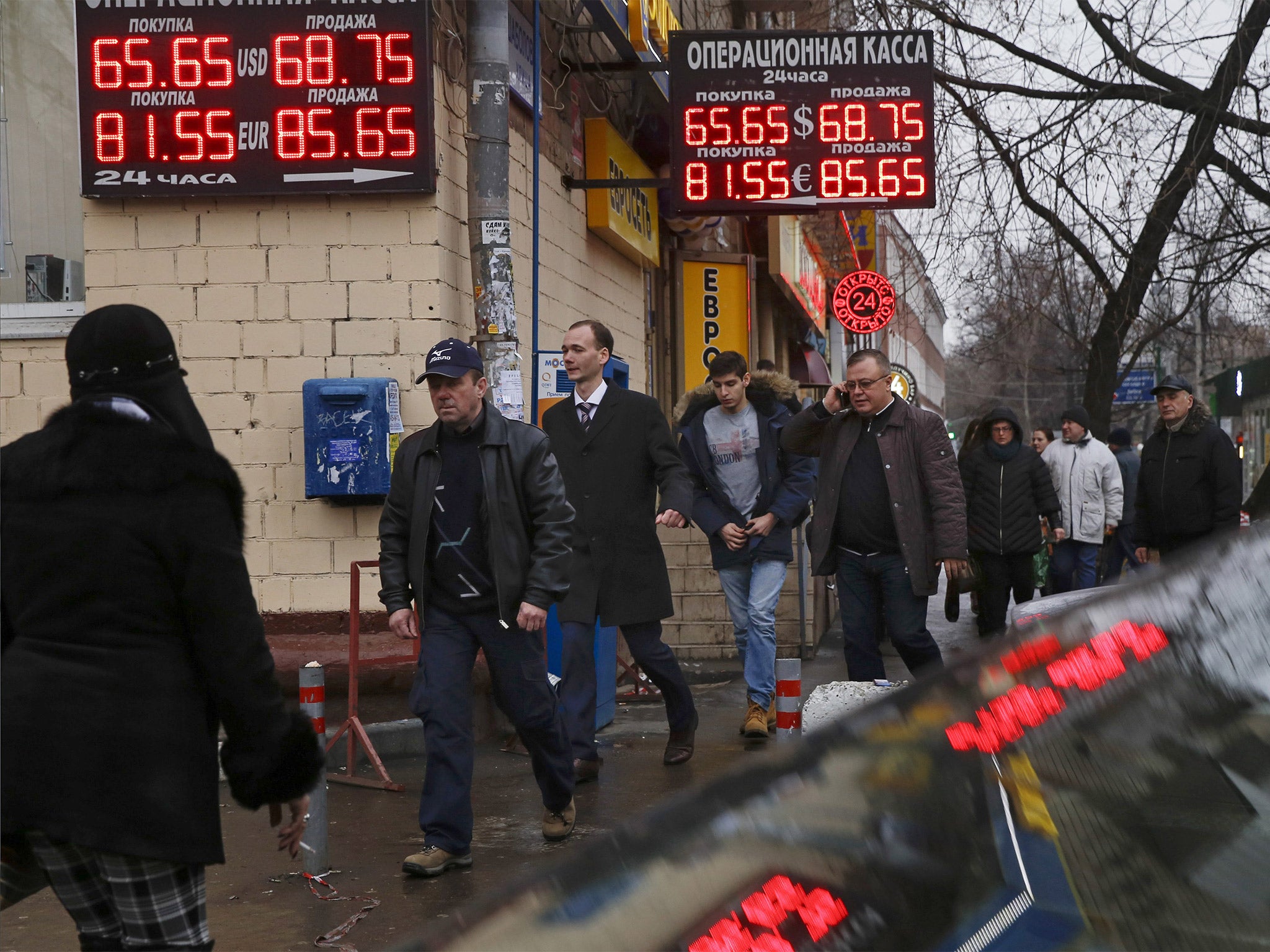The west’s economic sanctions against Russia have plenty of bite for once. How will Moscow respond?
European governments have accepted that they will have to pay a real price for the measures enacted. That’s an important step. Russia has been left grappling with a currency in freefall and what looks increasingly like a looming banking crisis, writes James Moore


When the west talked about waging economic warfare against Russia in recent weeks, it was easy to dismiss the rhetoric, all the more so when Britain – to take one example – initially unveiled a limp package of sanctions. Boris Johnson’s mendacious bluster about being “ahead” and standing firm with Ukraine was recognised as such.
Johnson wasn’t alone with his chest-beating, however. European, and in particularly Germany’s, reliance on Russian gas looked like it might spare Russia the worst, preserving its membership of Swift, a key part of the international payments system, among other things. With Russia’s central bank having built up a formidable war chest of currency, it looked as if it would be able weather any limited sanctions-related pain.
But as Russian artillery continued to smash into Ukraine, a switch was flicked. The brazenness on display demanded response not least because, prominent in the minds of frontline states was an uncomfortable question: “Who’s next?” Those countries with a little more distance faced a different, but no less uncomfortable, query: “What do we do if this is just the first domino?” Those questions, as much as the horror unfolding on TV screens, turned the rhetoric real and the economic cold war hot.
Swift was duly closed off, albeit partially. Perhaps more significant was the freezing of the Russian central bank’s reserves, dealing a heavy blow to the much discussed war chest built up to protect Vladimir Putin against the yapping he expected from the west. Suddenly, utilising those reserves became a whole lot more difficult because a substantial chunk of the vast reserves built up couldn’t be liquified.
Even the Swiss eventually fell in line with the EU’s sanctions. Yes the Swiss, who remained open for business throughout the Second World War.
There was more. BP, under intense pressure, announced the divestment of its 20 per cent stake in Rosneft, the Russian oil group. Others started to divest their holdings. A country that had held membership of the G8, until a previous episode of military action in Crimea turned it back into the G7, was becoming increasingly isolated.
The west’s decision to ensure its bite matched its bark drew economic blood on Monday morning: a stunning 40 per cent fall in the value of the rouble for starters. The Russian central bank responded, more than doubling interest rates, and the currency recovered some of its losses. But the level it found – still 20 per cent off its previous close – is plenty enough to spark an inflationary charge. With potentially worse to come.
The European subsidiary of one of the country’s largest banks, Sberbank, meanwhile, was reportedly teetering on the brink. The UK foreign secretary, Liz Truss, then announced later on Monday that Britain will lock it out of sterling clearing and slap sanctions on three other banks.
Russians started lining up outside bank branches and ATMs, seeking currency, and ignoring appeals for calm. We can see what runs on banks look like by harking back to Northern Rock in the UK. All it took for queues to form outside branches was a report that said it had accessed a Bank of England facility set up to help banks through the credit crunch that had developed in 2007.
There were calls for calm from the authorities then, too, but the run took on its own logic. At the time there was a scheme to compensate depositors with up to 90 per cent of their funds. Faced with the risk of a 10 per cent haircut, people ignored the appeals and took out their cash because, for them, it was the sensible thing to do. Why leave it to chance?
Russia faces a far greater crisis than the Rock found itself in. Its people have far less faith in their institutions than the British did. Getting their hands on as much cash as possible is the logical response to events that Russia’s compliant media cannot entirely shield its citizens from.
Runs on banks, sparked by mass withdrawals, can get very messy very quickly. It appears the Russian central bank is holding off on placing limits on withdrawals, which is actually a sensible step on its part. If that were to change, it would inevitably encourage people to queue to withdraw what they can. But it might eventually have to take the step.
The longer term economic consequences of these sort of events are far reaching and malign. But the big question is how much impact they will have on Putin.
Russia has a long history of rulers that have been perfectly willing to pummel their own people – people who have been made resilient and resourceful as a result.
So that remains an open question, even when the measures I’ve discussed are combined with efforts to clip the wings of Putin-linked oligarchs and legislators, which are being ramped up (Britain has shown a lot more bark than bite there).
The world changed when the first Russian tank crossed the Ukrainian border. That holds true for the financial world, too.
Whatever the outcome, expect to hear the phrase “political risk” a good deal more in discussions about matters financial from hereon out.






Join our commenting forum
Join thought-provoking conversations, follow other Independent readers and see their replies
0Comments